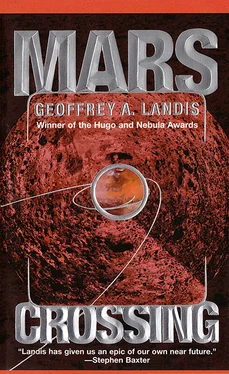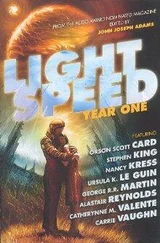Ryan reached down and touched the ground tentatively. The polar cap surface was dust mixed with ice, a rough, crusty surface. He tapped it gingerly. It seemed solid. “Ice,” he said. He rapped on it solidly and looked up at them. “The crust is ordinary water ice. But below the crust, it must be carbon dioxide—dry ice. It’s slowly sublimating away in the heat. When it gets trapped—wham. It all blows out at once.”
Already the sudden geyser was beginning to die away. In a few minutes, all that was left of it was a patch of broken snow.
“For certain we can’t stay here,” Ryan said. “We head north.”
“On foot?” Tana asked. Nobody said anything; the answer was obvious. “How far?”
“About two hundred and fifty kilometers,” Ryan said.
“You’ve got to be kidding.”
It took Tana ten minutes of searching to find the inertial navigation system. The laser gyros had no moving parts; it was a design that had been built to locate airplane crash sites on Earth. She checked it. “Still working. We ought to write the manufacturer.” It had been designed to be tough.
Ryan was ripping parts of skin off the Butterfly and examining their flexibility, but they didn’t seem to meet his needs. He moved over to salvage struts out of the wreckage of the seats, apparently a bit more to his liking. He looked up. “Do you know how to ski?”
“Now you really have to be kidding,” Tana said.
He held up one of the struts. It was a piece of aluminum-lithium alloy, strong and light. He had been able to flatten it down, and bent a crude curve at one end. He examined it critically, and then started to work on another. “Do you have another idea?”
Tana shook her head.
“North,” Ryan said.
The sun was circled by a luminous double halo, with mock suns on either side. It never set, but only circled constantly around them, dipping down almost to the horizon in front of them and then rising up at their backs.
The ground was a jumbled chaos of pressure ridges and fragmented ice-blocks half buried in snow. In regions the ground was solid ice, crisscrossed with cracks that hissed out jets of snow-laden vapor, and in other regions gleaming new snow lay flat and smooth and inviting. Ryan cheerfully steered into the middle of one of these, and as his makeshift skis touched the snow, it hissed and foamed around him. All friction vanished, and he skidded helplessly away on a cushion of foaming carbon dioxide vapor.
It took him an hour to painstakingly make his way out of the trap, warming each step down until he reached solid footing. After that, they learned to avoid the areas of new snow.
After six hours of skiing, Ryan called for a halt. They pulled off their skis and inflated the emergency habitat.
The emergency habitat was a cylinder, two meters long and a meter and a half in diameter, with translucent walls made of polyimide impregnated with netting of ripstop superfiber. An even, pinkish-orange light filtered through the habitat walls, making the inside look like the interior of a furnace. But the inside was cold. The only heat came from the radiators of the isotope power units on the Mars suits. It was so tightly crowded inside that it was hard for them to take their suits off; it had been designed to keep one person alive while waiting for rescue. But nobody was coming to rescue them. They silently stripped down to just the suit liners and piled together in the middle for warmth.
It was nearly impossible to sleep, and they huddled together, too tired to move, too tired to complain. With the continuous sunlight, there was no sense of time. After six hours, without any discussion, they put their suits on.
When they got outside, they saw that the waste heat from the sausage habitat had sublimed the ice away from under it, and the sausage had settled into a hollow half a meter deep.
They continued north.
For the first three days, snow geysers burst forth unexpectedly all around them, and they constantly worried that at any moment one might open beneath them. As they worked farther north, the snow geysers got smaller and less frequent, until they stopped being a threat.
In some places, the ice was just a thin crust suspended above a layer of gas below. The first footstep to touch it would trigger a collapse, and with a rattling crunch, an area as large as a soccer field would suddenly fragment and fall a distance of two or three centimeters.
They would walk on the rough ice, and ski across the snow, until Ryan called a break. He inflated the sausage, and they crawled into the cold, stinking interior. It was a relief to take the suits off, even briefly. After a month of nearly continuous wear, every wrinkle and irregularity of the suits was rubbing their skin raw.
But in the constant light, none of them could really sleep. They took to resting only for three-hour naps, huddling in a semiconscious stupor that was neither sleep nor wakefulness, until Ryan told them it was time for them to put on their suits and push onward.
They came to cliffs of ice and laboriously hacked steps into the ice to climb. The route was upward, ever upward. Twice they came to immense crevasses, hundreds of meters wide, crossing their path. The depths were misty with a white fog, fading into darkness as far down as they could look. It was impossible to cross them, and so they detoured around, cursing at the delay.
They continued north.
Estrela Conselheiro had experienced snow, but never so much of it. In the years she had lived in Cleveland, the winters had been mild, and snow was a rare thing, something that came once or twice a winter, melting in a day or so. Some of the older people in the city told stories of how in the last century it had been different, how the winters had been cold, and snow a meter deep, but no one really remembered.
Now she was surrounded by it.
In places the wind had sculpted the snow up in ridges like frozen waves. Other places the ice was swept clear of snow and glowed almost blue in the pale sunlight.
In all directions, as far as it was possible to see, there was only ice. Estrela had to confront the secret that she had never shared with any of the crew: The immensity of Mars terrified her.
They moved in silence. Estrela felt as if she were alone on the face of an uncaring planet. She seemed to be walking in a narrow cavern, a knife-thin slot between the blue-white ice below and the dirty yellow sky above. She felt that she was small, an insignificant speck crawling across the wrinkled ice.
But, to her surprise, she realized on the second day that it no longer terrified her. The ice was just ice, the sky just sky. Neither ice nor sky cared who she was or what she had done. She didn’t have to explain herself to them, didn’t have to pretend to be anybody. She could forget the others, forget even João, in the presence of uncaring immensity. It was as if she weren’t even there at all.
Estrela walked as if hypnotized, half-numbed from cold, numbed from lack of sleep, ignoring the others, alone inside her suit.
Alone between the ice and the sky, Estrela Conselheiro felt free to be nobody at all.
It took them eight days to reach the pole.
They came over the ice ridge, and Jesus do Sul was visible. Or the top half of the spacecraft was visible.
Jesus do Sul had sunk into the ice.
Estrela stopped abruptly, as if suddenly waking from a long trance. “ Jesus do Sul ,” she said softly, as if it were some puzzling words she were trying to understand, and then, more firmly, “ Jesus do Sul .” Then suddenly she screamed and ran toward the ship. “João! João!”
Читать дальше












